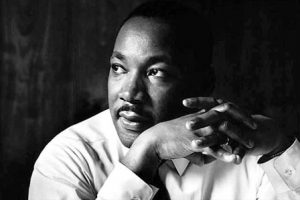 Fifty years ago this Tuesday, Martin Luther King delivered his “Beyond Vietnam” speech. USA Today recently noted: “On April 4, from the altar of Riverside Church in New York, King condemned the war. He did so against the wishes of his advisers, and even though he knew it could erode his already-fading public support, financially cripple his organization, and end his relationship with a president who’d done more for civil rights than any since Lincoln.”
Fifty years ago this Tuesday, Martin Luther King delivered his “Beyond Vietnam” speech. USA Today recently noted: “On April 4, from the altar of Riverside Church in New York, King condemned the war. He did so against the wishes of his advisers, and even though he knew it could erode his already-fading public support, financially cripple his organization, and end his relationship with a president who’d done more for civil rights than any since Lincoln.”
King said in his speech: “There is at the outset a very obvious and almost facile connection between the war in Vietnam and the struggle I, and others, have been waging in America. A few years ago there was a shining moment in that struggle. It seemed as if there was a real promise of hope for the poor — both black and white — through the poverty program. There were experiments, hopes, new beginnings. Then came the buildup in Vietnam, and I watched this program broken and eviscerated, as if it were some idle political plaything of a society gone mad on war, and I knew that America would never invest the necessary funds or energies in rehabilitation of its poor so long as adventures like Vietnam continued to draw men and skills and money like some demonic destructive suction tube. …”
King gave his speech before the group Clergy and Laity Concerned about Vietnam. He said to them: “The war in Vietnam is but a symptom of a far deeper malady within the American spirit, and if we ignore this sobering reality — and if we ignore this sobering reality, we will find ourselves organizing ‘clergy and laymen concerned’ committees for the next generation. They will be concerned about Guatemala and Peru. They will be concerned about Thailand and Cambodia. They will be concerned about Mozambique and South Africa. We will be marching for these and a dozen other names and attending rallies without end, unless there is a significant and profound change in American life and policy. …
“Our only hope today lies in our ability to recapture the revolutionary spirit and go out into a sometimes hostile world declaring eternal hostility to poverty, racism, and militarism. With this powerful commitment we shall boldly challenge the status quo and unjust mores … A genuine revolution of values means in the final analysis that our loyalties must become ecumenical rather than sectional. Every nation must now develop an overriding loyalty to mankind as a whole in order to preserve the best in their individual societies. This call for a worldwide fellowship that lifts neighborly concern beyond one’s tribe, race, class, and nation is in reality a call for an all-embracing and unconditional love for all mankind.” See here for text and audio.
After King was attacked for his remarks at Riverside, including by media such as the New York Times and Time magazine, he spoke out even more passionately. From the pulpit of his own Ebenezer Baptist Church in Atlanta later that month, on April 30, 1967, he would deliver the sermon “Why I Am Opposed to the War in Vietnam,” in which he stated: “There is something strangely inconsistent about a nation and a press that would praise you when you say, ‘Be nonviolent toward [segregationist Selma, Ala. sheriff] Jim Clark!’ but will curse and damn you when you say, ‘Be nonviolent toward little brown Vietnamese children!’ There is something wrong with that press!” See here for video and text. This speech would later win a Grammy.
Rev. GRAYLAN S. HAGLER, gshagler [at] verizon.net, @graylanhagler
Hagler is senior pastor at the Plymouth Congregational United Church of Christ in Washington, D.C. and chairperson of Faith Strategies.
MICHAEL McPHEARSON, mcphearson [at] veteransforpeace.
McPhearson is the national executive director of Veterans For Peace. See: “50th Anniversary of Dr. King’s ‘Beyond Vietnam’ Speech.”